Growing revenue is front of mind for most companies looking to recover from a period of contracted business and slowdowns. For those that want to expand globally, and explore new markets, how can they make the most of opportunities, avoid risk, and maximise cash flow?
One effective solution is surety bonds. Providing protection to the customer against supplier defaults, they offer an alternative to bank guarantees with the benefit of greater financial flexibility.
In a global infrastructure boom and during a time of ongoing geopolitical and economic challenges, it comes as no surprise that demand for surety bonds is on the rise, and is expected to grow by 6.4% to reach $25 billion by 2027. Not only are surety bonds a valuable solution for all parties, but they are now often a mandatory condition of supply.
How do surety bonds support international business?
Like a bank guarantee, surety bonds protect the customer against any loss due to a late or incomplete delivery on the part of their supplier. Commonly used in large cross-border projects such as construction, infrastructure, resources, and manufacturing, surety bonds are usually mandatory for public tenders and are increasingly required for private projects.
As a legally binding contract between three separate parties (the Obligee, Principal, and Surety), a surety bond reduces the risk of entering into an international contract, by comforting the Obligee (the customer) to ensure the Principal (their supplier) will meet the terms of their contract, safeguarding against their failure to do so.
Surety companies rigorously evaluate contractors’ abilities to successfully perform their contracts both technically and financially.
The Surety (the insurer) is the third party who provides the bond, mainly in the form of a First Demand Guarantee, so that if the Principal does not meet the contract terms, the Obligee can claim on the bond to recoup their losses. The Surety pays the value of the bond to the Obligee and then recovers that amount from the Principal.
This is especially useful for long-term cross-border projects where different legal and operating systems are involved, and where recovery of debts would otherwise pose a challenge.
The key to driving global expansion
For companies looking to win large-scale tenders and expand their business internationally, surety bonds offer several advantages.
- They help to improve liquidity by avoiding the need for a bank guarantee. Then, companies can reserve those lines of credit for working capital or to meet their other obligations.
- Surety bonds help a company to explore new markets. This allows them to successfully bid for work in an increasingly complex global marketplace, where they may not be familiar with the operating and legal conditions, or during periods of uncertainty.
- Surety bonds can help foster long-term relationships and trust between the customer and the supplier.
Effectively, suppliers can provide their customers with a high level of confidence in their ability to meet the terms of the contract, and that they will otherwise be compensated.
For the customer, the peace of mind that a First Demand Guarantee is generally paid out within a matter of 48-72 hours via SWIFT provides added confidence in moving forward with a supplier, regardless of their track record.
Building diversification in financing
As an alternative to traditional bank guarantees, surety bonds offer companies a way to diversify their financing, helping to avoid cash flow shocks by freeing up assets that would otherwise be tied up as security by the bank.
In doing so, companies can reserve their bank credit facilities and corporate assets for other purposes, making it easier to manage their cash flow and broader finances. Contrastingly, bank guarantees come with liability, and can significantly affect a company’s borrowing limits and growth capability.
Companies often use surety bonds to support their risk strategy, as they are considered one of the most cost-effective forms of financing. Surety premiums are charged only on usage, with annual premiums including fronting fees paid in advance, and are only valid for the period of the contract, or for a maintenance period afterwards.
Since surety bonds tend to be long-term, they are not as strongly impacted by economic fluctuation, making them more suitable than other forms of financing in the current global financial climate.
With concern around interest rates across the world, many companies are turning to surety bonds for a reliable and cost-effective solution.
Fronting: the critical factor for cross-border success

In the case of surety bonds for international transactions, an insurer’s fronting relationships are a critical part of winning business.
When an insurer receives a request to issue a guarantee like a bid bond, they need a way of identifying the various legal and operating factors within that country and assessing how they differ to the country where the supplier normally operates. So, they work with a local fronting partner.
A local surety or fronting partner is chosen for their in-depth knowledge and local expertise, so that the surety bond can be issued successfully.
Without appropriate fronting partners in place, a company risks being denied the surety bond.
With a local fronting partner to advise and negotiate on the conditions and wording of the bond, the supplier is protected against the customer calling the bond without proof of failure.
In the case that the customer does make a legitimate call on the bond, it ensures it is processed smoothly without being thrown out by the local court.
Further, a customer can impose rating requirements on the Surety’s local fronting partner, such as AA-.
In some markets, there may not be a bank with such a rating, but an insurer can often locate a subsidiary or branch in that country with an acceptable rating. In some cases, the insurer may need to provide several options to the customer. It is the insurer’s access to well-established fronting networks that is critical to the successful issue and acceptance of a surety bond, and ultimately a company’s ability to win that business.
The future of international bonding operations: e-bonds and blockchain
While bonds have been administered efficiently for many years, they are now even faster thanks to the widespread availability of e-bonds.
Now, a standard bond can be requested seamlessly via smartphone using an insurer’s or broker’s front-end portal, and have it issued within ten minutes instead of several days. For more specific bonds, a front-end portal allows for customised text to be uploaded, reviewed, and issued within a few days.
The acceptance of e-bonds varies, but it is becoming more commonplace. For example, in France, all public tenders are now able to accept e-bonds and other forms of digitalised documentation, such as digital signatures in accordance with European eIDAS standards.
The result is an acceleration in the pace of international business. For suppliers, this means that they can respond faster to bids as they arise, helping them make the most of opportunities and be more competitive.
User behaviour is now driving insurers to innovate and provide user-friendly, effective solutions for bond requests. Now an insurer’s key selling feature is not the bond product itself, but the speed and usability of their systems.
With new players entering the market with entirely electronic operating systems, insurers will need to rapidly adapt and invest in fast front-end portals.
Brokers are starting to benchmark the speed of the various portals, in many cases creating their own multi-issue platforms, serving end-users who are increasingly driven by speed.
A common challenge has been the lack of a streamlined ecosystem. Blockchain solutions in surety bonds are starting to appear, helping both the supplier and their customer to ensure the bond being issued is valid.
The Institutes RiskStream Collaborative (the insurance industry’s largest enterprise-level blockchain consortium) and The International Credit Insurance & Surety Association (ICISA) have announced a new working group, with the objective of streamlining the power of attorney registration and verification process for the ecosystem, and simplifying the development and adoption of blockchain technology in the industry.
For companies wanting to succeed in cross-border business, this is another positive advancement and reason to consider surety bonds.
The demand for surety bonds will continue to rise. For many companies, it is now the case of “no bond, no market”. For those looking to win new business in a global marketplace, the innovation and evolution of the surety industry will no doubt ensure they are positioned to take advantage of future opportunities.

































